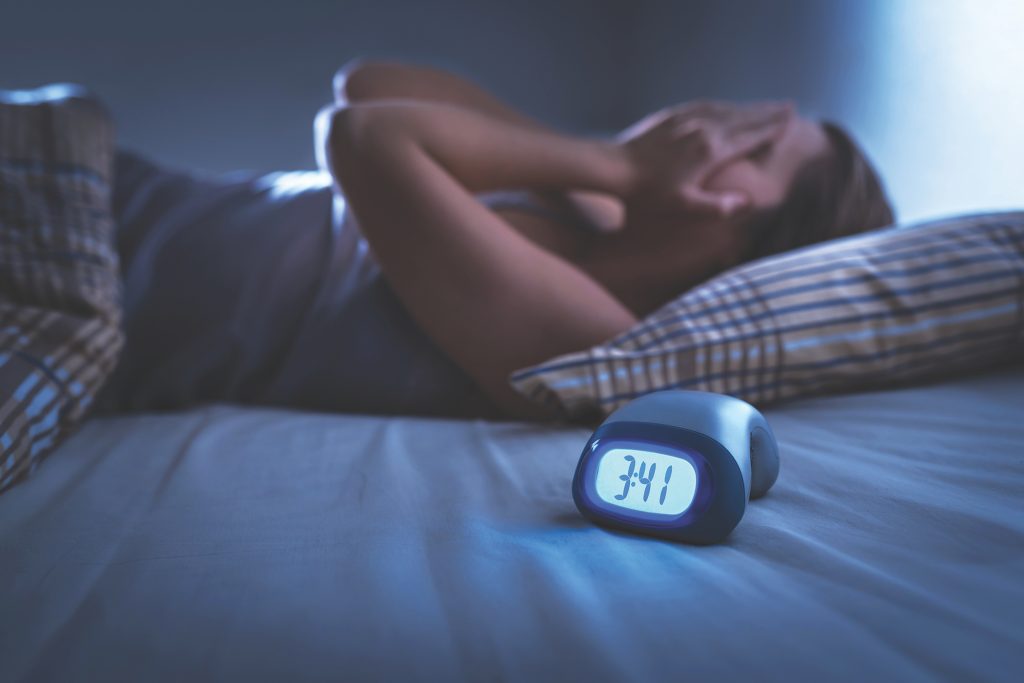
Features
Limiting sleep disorders among police officers
October 27, 2021 By Blue Line Staff
 Photo Credit: TEROVESALAINEN /
ADOBE STOCK
Photo Credit: TEROVESALAINEN /
ADOBE STOCK Sleep problems affect the vast majority of police officers. In fact, nearly 60 per cent of police officers experience clinically significant insomnia (Angehrn), which is five times higher than the general population (Roth; Ford, Kamerow).
Most people are unclear as to what constitutes insomnia and how to address it. To answer these questions, Blue Line approached HALEO Clinic, a virtual care clinic specializing in sleep whose experts have developed a new approach to treating sleep disorders.
As Dr. Marie-Helene Favreau, HALEO’s medical director, explained, “Insomnia can be defined as having trouble falling asleep, frequent awakenings or waking up too early in the morning. It qualifies as a chronic condition when any of these symptoms reoccur at least three times a week, for three months or more. That’s when we start witnessing negative impacts on our physical and psychological health, along with increased risks of developing serious chronic conditions, such as diabetes, cardiovascular disease, anxiety and depression.”
Police officers deal with a much higher prevalence of sleep disorders mainly due to their shift work schedules, but it is also related to the stress of being exposed to intense, violent and/or traumatic situations as part of their role.
Reducing sleep disorder-related problems
To reduce the problems associated with sleep disorders, even for those with severe conditions and shift work sleep disorders, unique protocols have been created.
One such protocol was developed for Cognitive Behavioural Therapy for Insomnia (CBT-i), delivered by highly trained healthcare professionals through a virtual care platform. For Julien Heon, vice-president at HALEO Clinic, whose wife is a police officer in Montréal, ensuring access to high-quality care for sleep problems is a serious, yet unmet need. “CBT-i has been very difficult to access; there are very few trained experts in North America, and the waiting lists are extremely long. The traditional protocols are also quite long, with programs usually ranging from eight to 12 weeks. That’s why it was so important to develop a five-week program, delivered via video-conference through a mobile app. In other words, there’s now a trained sleep expert in every town, coast to coast, with no waiting list.”
“55% of police officers in Canada are diagnosed with chronic sleep disorders.”
The program is also designed for organizations looking to support employee health, safety and performance. Employers are provided with a suite of communication and program reporting tools, while their employees can enter the clinic on their own by completing a short, clinically validated online questionnaire to evaluate their sleep, or by downloading the HALEO app. “Recently, we attended the Canadian Association of Chiefs of Police, and the Québec Association of Chiefs of Police Annual meetings, and the interest level from most departments in the country is extremely high,” said Heon.
Sleep disorders in police officers
Studies have routinely shown that sleep disorders significantly reduce the ability of police officers to make the right decision quickly, and they have also proven to increase absenteeism, workplace accidents, disability, and medication cost for organizations. Furthermore, those same individuals will be dealing with more irritable moods, fatigue, and anxiety and depression symptoms that will heavily impact their personal lives as well. “We are helping individuals who have been struggling with their sleep for 10 or more years, who have concluded that they could never have good sleep again or have tried everything, including medication and other techniques,” Heon continued.
One patient, Louis Moffatt, a lieutenant-detective with 20+ years of service stated, “The program quickly changed my ability to sleep well, for seven or more hours, without any medication. I could see an impact on my ability to perform at my best on the job while also being the best dad for my kids when I get home—both aspects that were heavily impaired when I was struggling with my sleep. I am a high performer, and not being able to sleep properly was challenging. I’d recommend the program to any peer who wants to improve their sleep”.
References
- Angehrn, A et al. Sleep Quality and Mental Disorder Symptoms among Canadian Public Safety Personnel. International Journal of Environmental Research and Public Health. 2020.
- Roth, T. New developments for treating sleep disorders. J Clin Psychiatry, 2001, 62, 3–4.
- Ford, D, Kamerow, D. Epidemiologic Study of Sleep Disturbances and Psychiatric Disorders: An Opportunity for Prevention?
Print this page